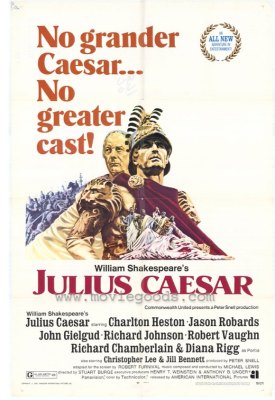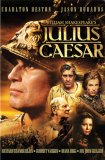| Reviews & Columns |
|
Reviews DVD TV on DVD Blu-ray 4K UHD International DVDs In Theaters Reviews by Studio Video Games Features Collector Series DVDs Easter Egg Database Interviews DVD Talk Radio Feature Articles Columns Anime Talk DVD Savant Horror DVDs The M.O.D. Squad Art House HD Talk Silent DVD
|
DVD Talk Forum |
|
|
| Resources |
|
DVD Price Search Customer Service #'s RCE Info Links |
|
Columns
|
|
|
Julius Caesar (1970)
After defeating the sons of Pompey, Julius Caesar (John Gielgud) returns to Rome where he is declared a God and all-powerful dictator. This doesn't sit well with Cassius (Richard Johnson) who, outraged and alarmed by Caesar deification, plots Caesar's assassination for the good of Rome. He enlists the aide of Caesar's close friend Brutus (Robards), along with other senators including Casca (Robert Vaughn) and Cimber (Michael Gough).
Upon his return, Caesar is warned by a soothsayer (Alba) to "beware the Ides of March," and his wife, Calpunia (Jill Bennett), is disturbed by a nightmare predicting his assassination. Despite this, Caesar is compelled to go to the Senate where he is brutally stabbed to death. Chaos follows, with Brutus and Cassius pleading the morality of their plot before the Roman people, while Caesar's loyal right-hand man, Marc Antony (Charlton Heston) quietly builds his case against the conspirators, tenuously allying himself with Octavius (Richard Chamberlain) for control of the Roman Empire.
Beyond the poetry of Shakespeare's dialogue, much of the greatness of the play, carried over somewhat effectively into this film version, is the ambiguity of the two factions. Are they driven by a loyalty to Rome that is greater than their loyalty to their friend Caesar, or are they driven by envy and ambition? This film version certainly foreshadows the unraveling of the alliance between Antony and Octavius, and is impressive in how it contrasts the lofty aims, at least stated by Cassius and Brutus, with the upheaval and pandemonium their actions create.
The film was directed by Stuart Burge, primarily a television director, though prolifically so, whose credits include a 1959 adaptation of Julius Caesar also featuring Michael Gough, this time as Cassius. The film is technically sloppy in odd little ways (Caesar's eyes twitching long after he's dead, angles that give away painted backdrops, etc.), suggesting the film was reaching for a grandness the time and money allotted just wouldn't permit. At times it has the look of an Italian peplum, with big sets and lots of extras in the battle sequences (filmed in Spain) yet cheap and tacky in other respects. (Again, the panning-and-scanning doesn't help.) Conversely, the film has an intimacy that pays due respect to both the actors and the text.
What people tend to remember about this Julius Caesar is, as Leonard Maltin calls it, Robards' "zombie-like" Brutus. Though inarguably one of the all-time great actors of the American stage (often excellent in movies, too), Robards was perhaps the definitive interpreter of Eugene O'Neill but has no sense at all for the language of Shakespeare. As Heston wrote in his The Actor's Life - Journals, 1956-1976, in Robards hands "it either comes out totally flat or totally verse," a fair assessment. Instead of a conflicted character torn by the demands of friendship and duty, Robards' Brutus is simply an ineffectual wimp.
Robards' scenes are compensated enormously by Richard Johnson's superb Cassius (played by Gielgud in the 1953 MGM version) and, briefly, Diana Rigg's Portia, though Robards compares badly next to their performances. Johnson all but carries the first third of the play, stating his case against Caesar plainly and compellingly, and later his bitterness at Brutus' miscalculations about Marc Antony are expertly realized. It's the best performance in the film. Diana Rigg makes the most of her one-scene appearance as Brutus's wife. It's little more than a moving vignette but she makes it memorable. (Burge's camera wisely stays on her, rarely cutting away to Robards' poker-faced reactions.)
The rest of the cast is serviceable to excellent. Gielgud's Caesar is an interesting mix of styles: he reads the lines in an oratory manner common to his generation of RADA actors (Olivier, etc.) who came out of the 1920s and '30s, but simultaneously plays to the camera with the subtlety of a seasoned film actor. Heston's Marc Antony - his second of three films in that role - is appropriately played larger-than-life, characterizations in which he excelled.
Chamberlain and Vaughn, primarily regarded as television actors at the time, come off quite well. Chamberlain makes his comparatively small role significant, while Vaughn is a wonderfully cautious and sardonic Casca. Well-known British character players pepper the cast. Christopher Lee's billing is sandwiched between Rigg's and Bennett's, but his role as Artemidorus consists of just five lines. Blink and you'll miss Andre Morell's Cicero, though Ron Pember (Dennis Timson on Rumpole of the Bailey) has a charming scene as the cobbler.
Video & Audio
Julius Caesar opens and closes with titles that are 4:3 letterboxed, but the rest of the film, originally in 2.35:1 Panavision, is panned-and-scanned. This is especially damaging during the assassination, where even the frenzy of telecine-ing can't keep pace. Original prints were by Technicolor, but the transfer is so old that the pallet appears over-saturated and inaccurate. The mono sound is also rather thin. The film was originally distributed in the United States by American International Pictures (!), but this transfer is derived from its Commonwealth United, U.K. release.
More boos and hisses to Artisan and Lions Gate for opting not to include English subtitles, or subtitles of any kind for that matter. Moreover, the film has just six chapter stops. There are no Extra Features.
Parting Thoughts
It's hard to believe that in 2007 a major label would, despite numerous requests from consumers for a 16:9 version (and complaints about the earlier DVD), release an all-star, epic film to DVD panned and scanned - twice. Of course, Lions Gate and Artisan are only shooting themselves in the foot. A 16:9 enhanced edition would have been greeted with much more enthusiasm, while this panned-and-scanned reissue probably won't sell precisely because it's panned-and-scanned. Julius Caesar deserves better.
Film historian Stuart Galbraith IV's most recent essays appear in Criterion's new three-disc Seven Samurai DVD and BCI Eclipse's The Quiet Duel.
|
| Popular Reviews |
| Sponsored Links |
|
|
| Sponsored Links |
|
|
| Release List | Reviews | Shop | Newsletter | Forum | DVD Giveaways | Blu-Ray | Advertise |
|
Copyright 2024 DVDTalk.com All Rights Reserved. Legal Info, Privacy Policy, Terms of Use,
Manage Preferences,
Your Privacy Choices | |||||||















